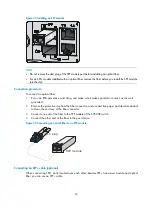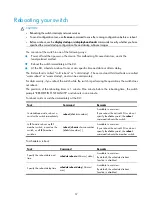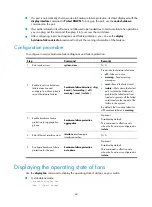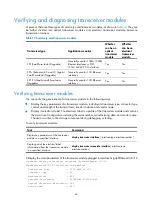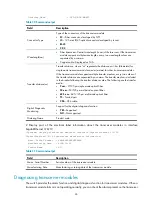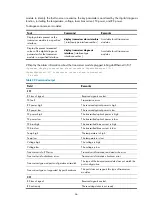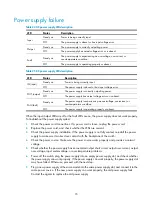
66
module to identify the fault source or examine the key parameters monitored by the digital diagnosis
function, including the temperature, voltage, laser bias current, TX power, and RX power.
To diagnose transceiver modules:
Task Command
Remarks
Display alarms present on the
transceiver module in a specified
interface.
display transceiver alarm
interface
[
interface-type interface-number
]
Available for all transceiver
modules
Display the present measured
values of the digital diagnosis
parameters for the transceiver
module in a specified interface.
display transceiver diagnosis
interface
[
interface-type
interface-number
]
Available for all transceiver
modules
# Display the alarm information about the transceiver module plugged in GigabitEthernet 3/0/1.
<Sysname> display transceiver alarm interface GigabitEthernet 3/0/1
GigabitEthernet3/0/1 transceiver current alarm information:
TX fault
Table 22
Command output
Field Remarks
SFP
RX loss of signal
Received signals are lost.
TX fault
Transmission error.
RX power high
The received optical power is high.
RX power low
The received optical power is low.
TX power high
The transmitted optical power is high.
TX power low
The transmitted optical power is low.
TX bias high
The transmitted bias current is high.
TX bias low
The transmitted bias current is low.
Temp high
The temperature is high.
Temp low
The temperature is low.
Voltage high
The voltage is high.
Voltage low
The voltage is low.
Transceiver info I/O error
Transceiver information read and write error
Transceiver info checksum error
Transceiver information checksum error
Transceiver type and port configuration mismatch
The type of the transceiver module does not match the
port configuration.
Transceiver type not supported by port hardware
The port does not support this type of transceiver
modules.
XFP
RX loss of signal
Received signals are lost.
RX not ready
The receiving status is not ready

